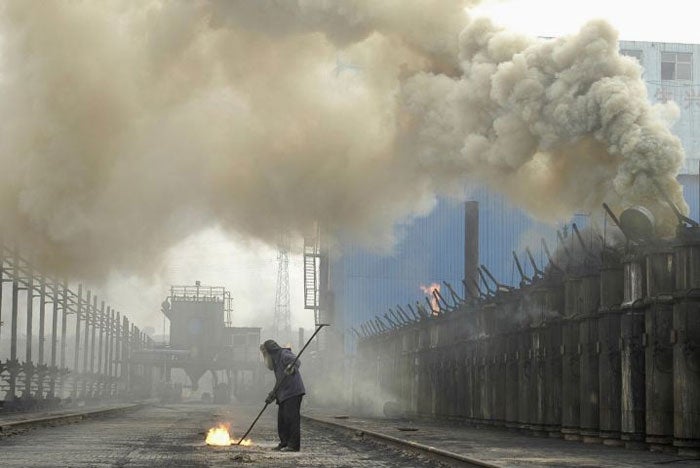Annual cost of climate change 'will be £190bn'
UN has underestimated financial burden of global warming, study finds

Your support helps us to tell the story
From reproductive rights to climate change to Big Tech, The Independent is on the ground when the story is developing. Whether it's investigating the financials of Elon Musk's pro-Trump PAC or producing our latest documentary, 'The A Word', which shines a light on the American women fighting for reproductive rights, we know how important it is to parse out the facts from the messaging.
At such a critical moment in US history, we need reporters on the ground. Your donation allows us to keep sending journalists to speak to both sides of the story.
The Independent is trusted by Americans across the entire political spectrum. And unlike many other quality news outlets, we choose not to lock Americans out of our reporting and analysis with paywalls. We believe quality journalism should be available to everyone, paid for by those who can afford it.
Your support makes all the difference.The true global cost of adapting to climate change is likely to be many times greater than official United Nations' estimates: in 2030 alone, the world could be spending more than three times the annual budget of the NHS, a study has found.
A team of British experts has discovered that the UN Framework Convention on Climate Change (UNFCCC) has seriously underestimated the expected annual cost of dealing with climate impacts. It suggests that the true cost could be at least two or three-fold greater, and possibly much more if other hidden factors are taken into account.
Estimates of how much the world will have to spend annually on adapting to some of the worst impacts of climate change have varied widely, but the UNFCCC has suggested that typically it could be about $70bn or $100bn (£44bn and £63bn) by 2030, the cost of about three Beijing Olympics. But other scientists have now suggested that the true annual cost could easily reach $300bn or more.
"Just looking in depth at the sectors the UNFCCC did study, we estimate adaptation costs to be two to three times higher, and when you include sectors the UNFCCC left out, the true cost is probably much greater," said Professor Martin Parry, the lead author of the report, Assessing the Cost of Adaptation to Climate Change. "The amount of money on the table at Copenhagen is one of the key factors that will determine whether we achieve a climate-change agreement. But previous estimates of adaptation costs have substantially misjudged the scale of funds needed," added the professor, a visiting fellow at the Grantham Institute at Imperial College London.
Adaptations to climate change include the additional spending needed to improve measures such as building new flood defences and transporting water for agriculture, treating an increase in the range and severity of diseases, and replacing buildings and other infrastructure affected by rising temperatures or water levels.
The UNFCCC had commissioned a series of studies to address the estimated costs of several adaptation measures but it was under pressure to produce results in a short time period and the studies were not fully reviewed by outside experts, Professor Parry said.
"Many of the previous estimates, it would be fair to say, were based on back-of-the-envelope calculations. In fact, one person said they were written on the back of a metro ticket. We think these numbers are underestimates... they don't stack up," Professor Parry said.
The authors of the report said that the costs of adapting to climate change begin to soar aftere other sectors of the economy not dealt with by the UNFCCC are taken into consideration. They includes tourism, energy and manufacturing. The sectors the UNFCCC did deal with were treated in only a partial manner, the report says.
One of the biggest underestimates is the additional cost of building new homes, offices, roads and other infrastructure affected by climate change. This cost alone could be many times higher than previous estimates.
Join our commenting forum
Join thought-provoking conversations, follow other Independent readers and see their replies
Comments